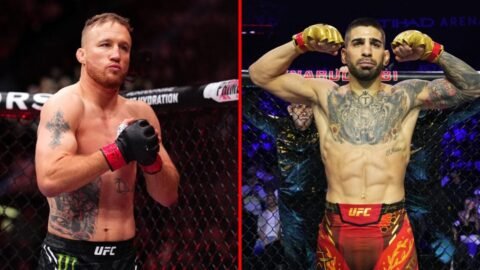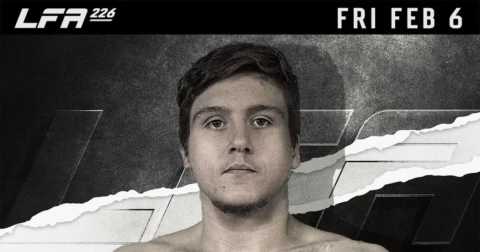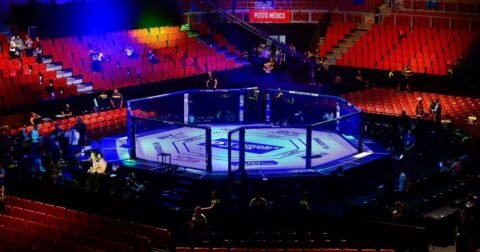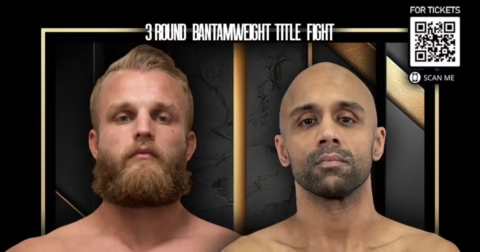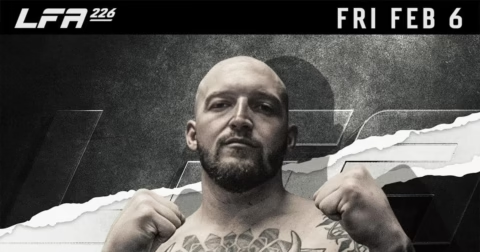Sean Loeffler: From UFC Hopeful to Sex Offender – Legal Fallout
The Sean Loeffler sexual abuse case has captured significant attention, particularly in the realm of MMA fighter news. Retired UFC fighter Sean Loeffler, once poised for a promising career, now faces the consequences of serious legal issues after pleading guilty to charges of sexual abuse in Oregon. With a background steeped in martial arts, Loeffler’s descent from paroled fighter to convicted sex offender paints a harrowing picture of his recent actions, drawing public scrutiny towards the circumstances surrounding his arrest. In addition to facing multiple domestic violence allegations last year, the unfolding details of Loeffler’s latest charges, which include felony sexual abuse and unlawful penetration, have sparked outrage. As a former athlete connected to the UFC, his case highlights the troubling intersection of fame and criminal behavior, leaving fans and advocates alike questioning the reliability of public figures in positions of trust.
In the unfolding saga surrounding ex-UFC fighter Sean Loeffler, the topic of sexual misconduct looms large. This case, entwined with allegations of sexual abuse and domestic violence, has revealed unsettling elements about the darker side of combat sports. The retired MMA competitor, once on the brink of a significant career milestone, is now grappling with severe criminal charges that have tainted his legacy. As details continue to emerge from the Oregon court hearings, the implications of Loeffler’s actions resonate beyond the octagon, offering a sobering reflection on the responsibilities that accompany notoriety. This development encourages a deeper conversation about accountability and the impact of such allegations on both victims and the broader community.
Sean Loeffler’s Legal Troubles: From MMA Fame to Felony Charges
Sean Loeffler, once a promising talent in the world of mixed martial arts, has become synonymous with controversy following his guilty plea to sexual abuse while on parole. Known primarily for his time as an MMA fighter affiliated with the UFC, Loeffler’s recent legal issues have overshadowed his athletic accomplishments. With over a decade spent in the octagon, this former UFC signee now faces a regrettable legacy tarnished by serious allegations of sexual misconduct and violence, impacting not just his reputation but also that of the wider MMA community.
The details surrounding the Sean Loeffler sexual abuse case reveal a troubling narrative that stretches back over several years. After being paroled for multiple domestic violence offenses, Loeffler found himself embroiled in further allegations that prompted law enforcement action in Oregon. Faced with a significant prison sentence exceeding twelve years, his decision to plead guilty can be viewed through the lens of both desperation and a desire to mitigate the consequences of his actions, despite claims of being falsely accused by his defense counsel.
The Fallout of Sean Loeffler’s Guilty Plea
The implications of Sean Loeffler’s guilty plea extend far beyond the courtroom, affecting his standing within the MMA community and raising questions about safety and accountability in sports. As a retired UFC fighter, his actions are scrutinized not only by fans but also by governing bodies in mixed martial arts. Loeffler’s case serves as a disheartening reminder of the challenges that athletes may face regarding personal conduct and the responsibilities that come with a public platform.
Moreover, the repercussions of this case highlight the broader issues of sexual abuse and violence within professional sports. The attention surrounding the Sean Loeffler sexual abuse case may promote discussions about how organizations manage accusations against their members, the protective measures in place for potential victims, and the repercussions faced by those found guilty. As retired fighters like Loeffler transition into new phases of their lives, the lessons drawn from their experiences could pave the way for systemic changes within the MMA and sports communities.
Understanding Legal Consequences for MMA Fighters
In the wake of Sean Loeffler’s legal battles, it becomes essential to analyze the legal framework that governs athletes in the MMA sector. Fighters often grapple with intense pressure and public scrutiny, and those who cross legal lines face serious repercussions. Loeffler’s case underscores the potential risks associated with legal misunderstandings and the imbalance of power often present in allegations of sexual offenses. His plea not only illustrates the dire consequences of such actions but also the importance of a fair legal process for all parties involved.
The wrestling with legal ramifications is further complicated by the lingering impact of public perception. MMA fighters like Loeffler must navigate their careers under the watchful eyes of fans and critics alike, shaping how their actions, both in and out of the ring, may be interpreted. Convictions stemming from domestic violence or sexual abuse charges not only signal immediate legal consequences but often end careers, prompting discussions on rehabilitation, accountability, and the potential for redemption. As the MMA community reflects on Loeffler’s actions, it brings forth new dialogues about ethics in sports.
The Role of Defense in High-Profile Cases
Sean Loeffler’s defense team, led by attorney Mike Arnold, plays a pivotal role in shaping public opinion and legal strategy amidst allegations of sexual abuse. By seeking to punctuate inconsistencies in the accuser’s statements, Loeffler’s defense attempts to frame the narrative in a way that suggests innocence in the face of serious charges. This tactic is not uncommon in high-profile cases where public sentiment can be volatile, and the stakes are immensely high. The legal maneuverability in such cases highlights the often complex interplay between defense strategies and the quest for justice.
Moreover, Loeffler’s circumstances open a dialogue about the implications of legal representation for athletes facing serious allegations. With the media spotlight firmly fixed on their lives, the right defense can mean the difference between a favorable outcome and a conviction. The inherent challenges within the legal system, particularly regarding high-profile individuals, emphasize the necessity for skilled representation and an unwavering commitment to factual evidence. Ultimately, the approach taken by Loeffler’s defense encapsulates a broader commentary on how athletes should manage reputations tainted by legal action.
Media Coverage of Sexual Abuse in Sports
The media landscape plays a crucial role in shaping how cases like Sean Loeffler’s are perceived by the public. With sensational coverage often dominating headlines, balancing journalistic responsibility with the duty to report facts is essential. The manner in which Loeffler’s case has been reported provides insight into the complexities of media influence on public perception, especially concerning sensitive topics like sexual abuse and violence against women in sports. How stories are framed can significantly impact both the accused and the accuser, as well as the overall dialogue about accountability in sports.
Furthermore, the media’s focus on the Sean Loeffler sexual abuse case highlights the need for responsible reporting. It’s essential to bring narratives surrounding athletes’ misconduct to the forefront while carefully considering the ramifications of public scrutiny. The coverage of such cases must navigate the fine line between informing the public and perpetuating sensationalism. As organizations within MMA and other sports continue to evolve, the relationship between media coverage, legal outcomes, and societal perceptions of abuse must be continually examined.
Community Reactions to Loeffler’s Case
Community reaction to Sean Loeffler’s legal troubles has been mixed, reflecting a battle between empathy for victims and support for a figure who once held a place of respect in the MMA realm. The revelations about his guilty plea have sparked discussions surrounding the need for systemic support for survivors, while simultaneously engaging those who struggle with acknowledging the fallibility of their sport’s heroes. Such dichotomies present an opportunity for open dialogues and education about the seriousness of sexual violence and the importance of believing and supporting victims.
Additionally, support systems within the community are being challenged to rise to the occasion, as advocates push for measures that protect and empower victims of abuse. Loeffler’s case has prompted conversations about the need for further resources and programs to assist those affected by sexual violence in various forms, underscoring a societal imperative to confront and dismantle norms that contribute to silence and stigma. The repercussions of the events surrounding Sean Loeffler may very well inspire a community-wide commitment to positive change and support for marginalized voices.
The Future for Sean Loeffler Post-Plea
As Sean Loeffler navigates the aftermath of his guilty plea, the question remains: what does the future hold for the retired fighter? With a potential sentence looming and the uncertainties surrounding the legal repercussions from the San Diego court, Loeffler’s path ahead is fraught with challenges. The stigma attached to his convictions may limit his opportunities both within and outside the realm of sports, further complicating his attempts at redemption. Many people will be watching closely to determine whether Loeffler can rehabilitate his image and manage life post-plea.
In light of his convictions, Loeffler may seek ways to contribute positively to discussions about accountability and change in the MMA community. Whether through advocacy work or sharing his story in an attempt to educate others about the dangers of substance abuse and violence, opportunities may arise for him to redefine his legacy. However, the weight of his actions and the trauma that the affected victims experienced inevitably shadow any potential future endeavors. Sean Loeffler’s narrative can serve as a critical reflection in sports, underscoring the need for accountability and the profound impact of one’s actions.
The Importance of Support Systems for Victims
The Sean Loeffler sexual abuse case brings to the forefront the urgent need for robust support systems for victims of abuse within the realm of sports and beyond. Victims often face significant barriers when it comes to reporting incidents, including fear, stigma, and a lack of resources. As athletes within the MMA community like Loeffler come under scrutiny for their actions, it becomes increasingly crucial to create safe spaces for individuals to voice their experiences and seek help. Protecting victims should be a priority, instigating comprehensive measures to offer immediate and long-term support.
Furthermore, the importance of education and outreach cannot be overstated. Creating awareness around issues of consent, healthy relationships, and the dynamics of abuse is paramount for prevention. Organizations within the MMA community must take a proactive stance in promoting positive behaviors and fostering a culture that encourages individuals to stand against abuse and offer support to those who have been affected. Loeffler’s case spotlights the extensive work still needed to combat sexual violence in sports and the imperative to empower victims.
Restoring Reputation: Challenges Faced by Fighters
For retired fighters like Sean Loeffler, the path to restoring a tarnished reputation is fraught with challenges post-guilty plea. The narrative surrounding his legal troubles may continue to cast a long shadow over his previous accomplishments in the sport. A once-promising career in the UFC may now be overshadowed by a conviction that raises serious questions about character and integrity. Thus, the journey toward rehabilitation requires more than just personal remorse; it demands a clear commitment to change and accountability.
Moreover, Loeffler’s experience serves as a strong reminder of the complexities involved in the restoration of an athlete’s public image. Engaging with the community, particularly with advocates for victims of abuse, can be one way to show that he understands the gravity of his actions. Additionally, athletes in similar predicaments may find it beneficial to learn from Loeffler’s situation, as it highlights the importance of navigating public scrutiny and finding pathways to positively contribute to societal conversations around abuse in sports.
| Key Points |
|---|
| Sean Loeffler, a retired MMA fighter, pleads guilty to sexual abuse while on parole. |
| Loeffler faced multiple domestic violence charges and received a two-year sentence in San Diego. |
| He was paroled in November after serving time and based on pre-sentence credit. |
| In February, he was arrested for felony sexual abuse involving a woman incapable of consent. |
| Loeffler pleaded guilty to a misdemeanor charge and had multiple felony charges dismissed. |
| Defense attorney argues Loeffler was falsely accused and points out inconsistencies in the accuser’s statements. |
| A warrant was issued for Loeffler’s extradition to California after his February arrest. |
| Loeffler was previously close to his UFC debut but has not fought in the UFC since the incident. |
Summary
The Sean Loeffler sexual abuse case has highlighted serious issues regarding accusations and the judicial process. After pleading guilty to sexual abuse while on parole, Loeffler’s history of multiple domestic violence charges and incidents raises significant concerns about accountability. Although his attorney claims Loeffler was falsely accused, the legal ramifications of his recent guilty plea have resulted in the dismissal of several felony charges. Moving forward, the public interest in the Sean Loeffler sexual abuse case underscores the importance of discussing consent and the difficulties faced by victims of abuse.



